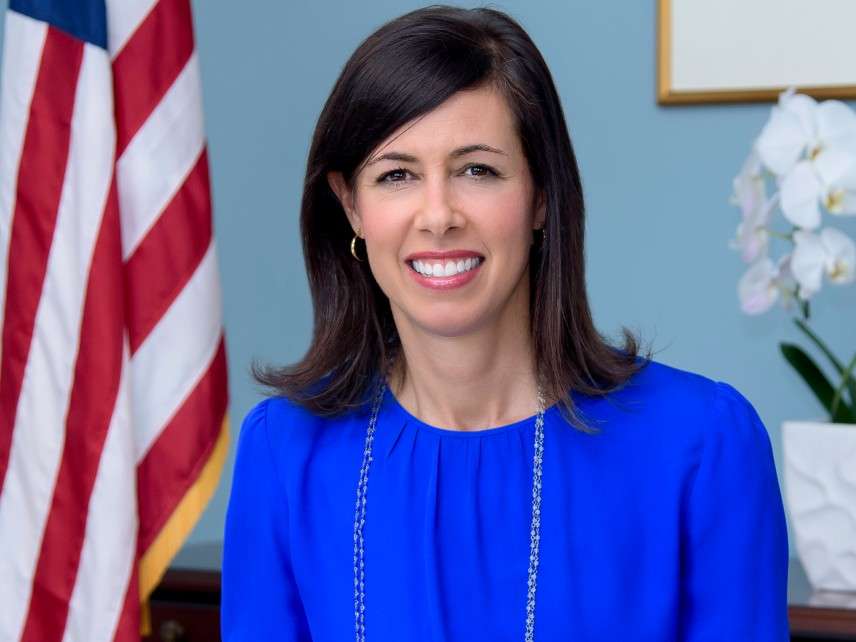FCC Commissioner Wants to Ban E-Cigarette Ads, Because 'Public Interest'
Jessica Rosenworcel overlooks the statutory and constitutional obstacles to her plan.

Jessica Rosenworcel, a member of the Federal Communications Commission, does not like TV and radio ads for e-cigarettes, and she seems to think they can be banned by reinterpreting the 1970 law that prohibited broadcast ads for conventional cigarettes. She is wrong.
"Today you won't see cigarette ads on television," Rosenworcel wrote on Twitter yesterday. "But nothing stops the ads for e-cigarettes, even if they are targeted at kids. The @FCC can help put a stop to this, and I think it should."
Rosenworcel explains how in a USA Today op-ed piece. "We do not need to sit idly by while the electronic equivalent of the Marlboro Man surfaces in new advertising that introduces the next generation to habit-forming tobacco products," she writes. "Congress charged the FCC with upholding the 'public interest' in its oversight of the broadcast industry….As one court recognized long ago, 'the public interest indisputably includes the public health.'"
Rosenworcel seems to be claiming that the FCC's mandate to regulate the airwaves in "the public interest" gives it the authority to impose whatever speech restrictions it thinks will promote "the public health," which is a pretty alarming conjunction of two vague, expansive phrases. As fellow FCC Commissioner Brendan Carr observed on Twitter today, "The FCC does not have a roving mandate to police speech in the name of the 'public interest.'" A little more concretely, Rosenworcel suggests that "we can work with the FDA to ensure that the Department of Justice—which interprets the Public Health Cigarette Smoking Act—does so in a modern way that recognizes the public health crisis from the growth in use of these addictive products."
Leaving aside the "public health" wisdom of suppressing information about products that offer a potentially lifesaving alternative to smoking, Rosenworcel's plan is dubious on both statutory and constitutional grounds. The statute to which she refers says "it shall be unlawful to advertise cigarettes on any medium of electronic communication subject to the jurisdiction of the Federal Communications Commission." It defines cigarette as "any roll of tobacco wrapped in paper or in any substance not containing tobacco." Since e-cigarettes contain no tobacco, interpreting the law "in a modern way" evidently means ignoring its plain meaning.
Even if the Justice Department managed that interpretive feat, there is the little matter of the First Amendment, which says "Congress shall make no law…abridging the freedom of speech, or of the press." When Congress enacted the Public Health Cigarette Smoking Act, the Supreme Court was still taking the position that "commercial speech" is not protected by the First Amendment. Hence it is not surprising that a three-judge panel of the U.S. District Court in Washington, D.C., upheld the ban on cigarette advertising in 1971, when six radio companies challenged it. The Supreme Court affirmed that decision without comment in 1972.
Since then, however, the Court has reconsidered the original version of the "commercial speech" doctrine, recognizing that advertising is constitutionally protected. Under the test it laid out in the 1980 case Central Hudson Gas & Electric v. Public Service Commission, restrictions on truthful, nonmisleading advertisements of legal products will be upheld only if they directly advance a substantial government interest and are no more extensive than necessary.
In the 2001 case Lorillard Tobacco v. Reilly, the Court used that test to overturn a Massachusetts ban on tobacco billboards within 1,000 feet of a school or playground. Although the Court deemed preventing underage tobacco consumption a substantial government interest and even accepted the dubious argument that advertising restrictions directly advance that goal, it said the 1,000-foot rule swept too broadly, barring outdoor tobacco advertising from "a substantial portion of Massachusetts' largest cities" and in some places amounting to "nearly a complete ban on the communication of truthful information about smokeless tobacco and cigars to adult consumers."
If Massachusetts legislators' desire to shield children from tobacco ads could not justify a state ban on billboards, it is hard to see how Rosenworcel's desire to shield children from e-cigarette ads could justify a nationwide ban on TV and radio ads. "Censoring lawful speech based on its content?" Commissioner Carr responded on Twitter yesterday. "I'm with the First Amendment. I'm a no."
At a press conference today, Rosenworcel reacted to Carr's pushback by insisting that "all I've done is called for the idea that the FCC, the FTC, and the FDA should come together, look at what laws are on their books, and identify if there are things we can do to assist with…what the FDA Commissioner called a public health crisis." Yes, and her main idea for assisting the FDA involves censoring speech.
Rosenworcel's obliviousness to the constitutional issue is especially striking because she has been quick (and correct) to say the FCC must resist President Trump's suggestion that the commission should use its regulatory powers to punish or suppress speech he does not like. "History won't be kind to silence," she said on CNN in 2017, "and I think it's important for all the commissioners to make clear that they support the First Amendment."


Show Comments (27)